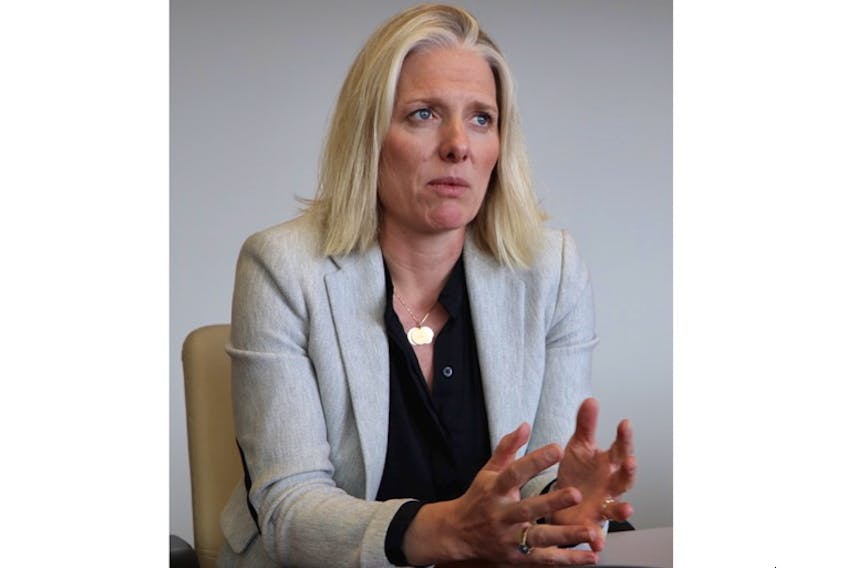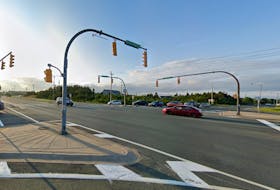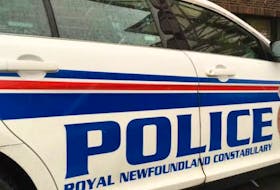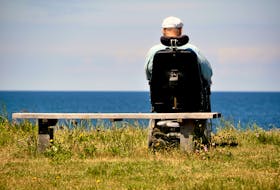ST. JOHN'S, N.L. — Federal Environment Minister Catherine McKenna says the term “ethical oil” isn’t one that she likes to use – unlike politicians in Newfoundland and Labrador.
MP Seamus O’Regan, Premier Dwight Ball and Progressive Conservative Leader Ches Crosbie are just a few who are on the record saying oil produced in the province’s offshore oil and gas sector carries less emissions than oil extracted in other parts of the world, and is therefore “clean oil.”
“That’s not really a line I would ever use,” said McKenna.
“I would say that Canada is doing all the right things in terms of putting a price on pollution, tackling methane emissions, our new clean fuel standard that we’re working on – all of these things you need to do.”
McKenna was in St. John’s on Thursday to meet with mayors, announce funding for climate change mitigation, and speak about the growing climate crisis in Canada.
Last week, McKenna introduced a motion in the House of Commons to declare a state of emergency in Canada related to the continuing effects of climate change being felt across the country.
McKenna says the motion carries no calls for additional funding or actions not currently being taken by the federal government, but rather asks members of Parliament to recognize the situation.
“Polarization on the issue of climate change, we’ve seen that the loser is environmental or climate action,” said McKenna.
“It says based on the science, we are increasingly in a climate emergency and we need to act together and meet our international obligations.”
Those international obligations refer to the Paris Agreement on Climate Change, signed in April 2016. The agreement calls on the 185 states that have ratified the agreement to decrease greenhouse gas emissions to prevent a 2 C increase in global temperature.
McKenna references instances of extreme weather in recent memory – and ongoing events – to highlight the need for action to reverse climate change.
“I live in Ottawa and we’re going through massive flooding. It’s a flood that was supposed to be every 100 years. The last time it flooded was two years ago,” she said.
“The impacts of this extreme weather we’re seeing are real. We’re seeing forest fires again in Alberta. If you remember last summer, we had forest fires out west. They’re burning longer and brighter than before.”
In November 2018, Newfoundland and Labrador was struck by what was the strongest storm system on the planet at the time, which caused power outages, damage to homes and property, and flooding. A seismic monitor at the time registered the strength of the winds and pounding waves literally shaking the island.
“We need to be serious about this. Climate change always seems to be this issue that polarizes people. On one hand you have folks who are saying stop everything right now, and on the other hand you have folks saying we’re not going to do anything,” she said.
“The reality is we have to demonstrate to Canadians that the environment and the economy go together.”
In 2014, Canada was the ninth highest greenhouse gas emitter on the planet, contributing 1.6 per cent of global emissions. China and the Unites States emitted almost half of all greenhouse gases in 2014, combining for over 41 per cent.
Newfoundland and Labrador is the eighth highest emitting province in Canada, emitting about 10 megatonnes of greenhouse gas in 2017. Alberta, Ontario, Quebec, Saskatchewan, and British Columbia combined to emit 91 per cent of greenhouse gas across the country in 2017.
The Advance 2030 plan introduced by the Liberal government in February 2018 would see oil and gas production double by 2030, the year by which scientists say the world must cut its emissions in half.
In 2019-20, the province is projected to take in just less than $1.1 billion in offshore oil royalties. The provincial carbon tax will take in $66 million in 2019-20 to try to curb industrial and personal greenhouse gas emissions.
“We all need to do more, but this is a transition. A transition doesn’t happen from one day to the next. Sometimes there’s a focus on pricing. It is a part of our plan, it’s a part of any credible climate plan. Newfoundland and Labrador has pricing that meets our standard,” she said.
“The plan is so much bigger than that. The innovation side of things is critically important. The Oceans Supercluster is looking at how to use renewable energy, whether it’s offshore wind or tidal.”
McKenna says it’s not a choice between saving the planet and saving the economy. She says climate change mitigation and economic growth can co-exist.
“Look, I am the environment minister but I have to be an economic minister as well. When you talk about the environment and climate change, there’s as much an economic case for finding clean solutions,” she said.
“We’re seeing lobster going north because there are cooler waters. That is a short-term good thing, but overall, the icebergs may be nice for tourists, but if you’re out in the water and you’re getting trapped by this ice, it’s less good.”
[email protected]
Twitter: DavidMaherNL









